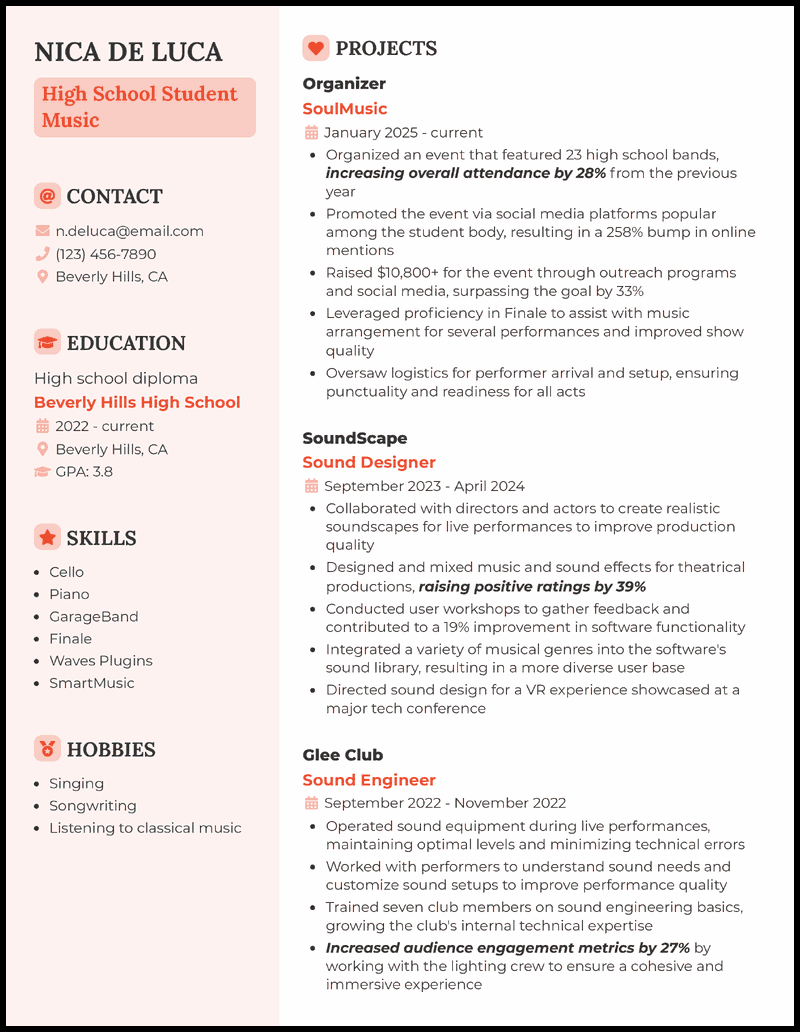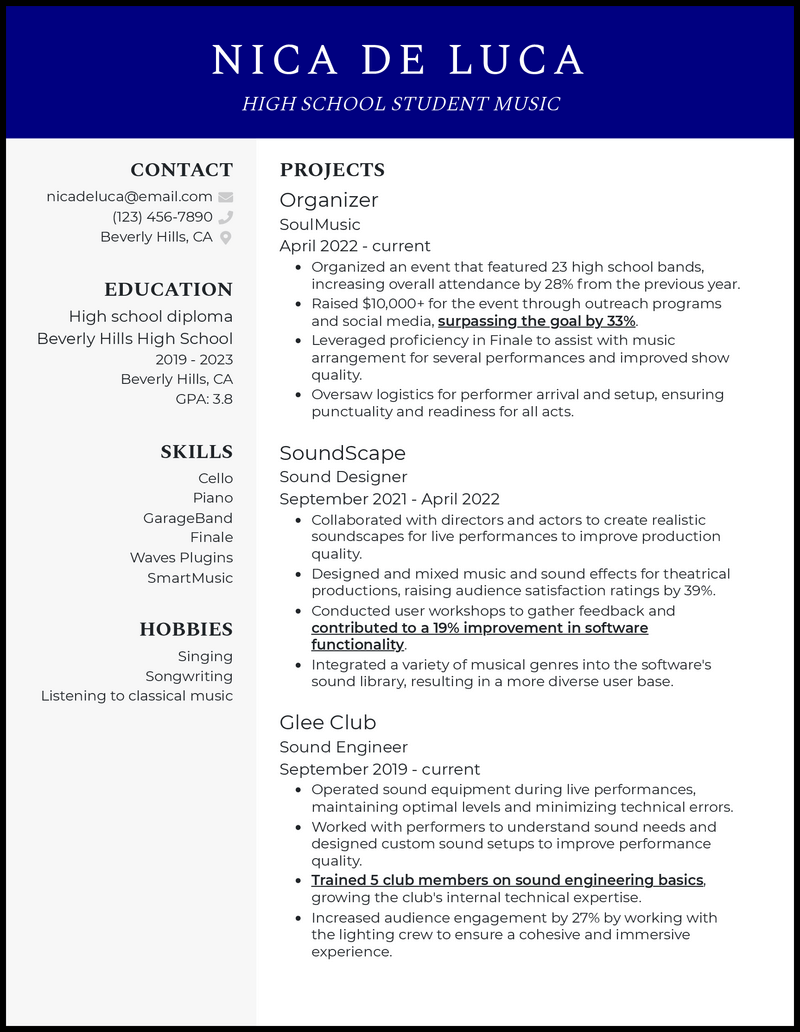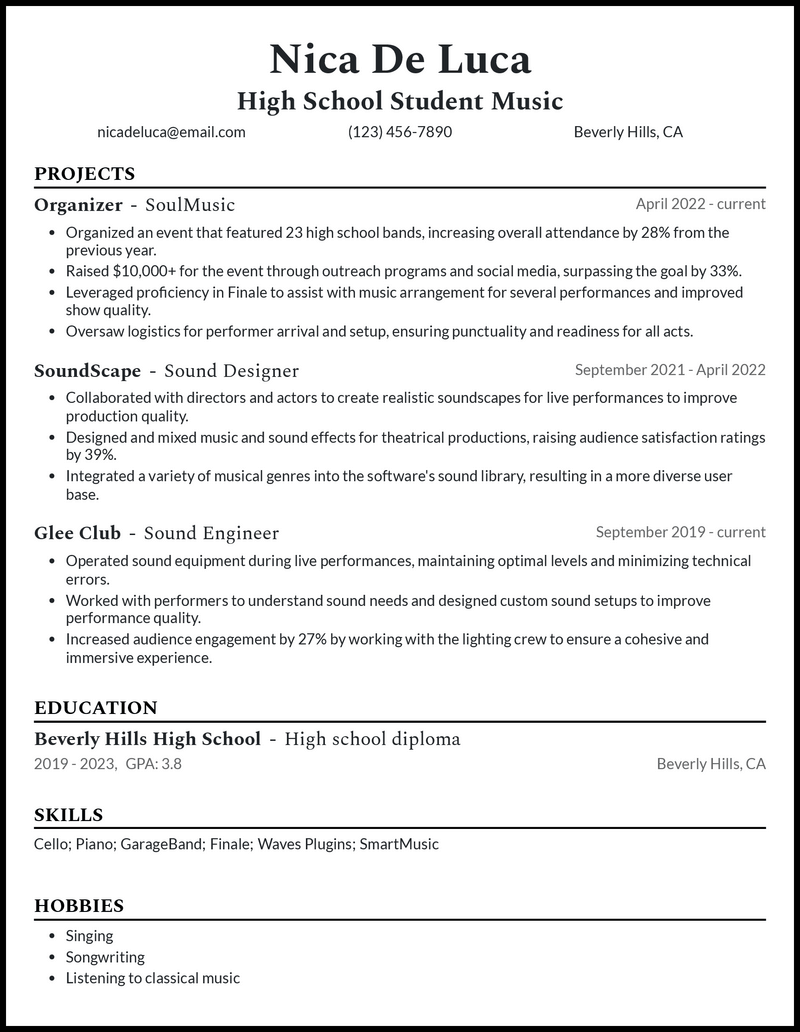You have a deeply rooted love for music and an unbreakable creative streak. You’ve studied music theory, performed live, and discovered a unique blend of tunes that perfectly fits your style.
Whether you’re angling to land your dream role in your school’s orchestra or you want to pick up a part-time gig at a record store, your enthusiasm for music is undeniable. However, it might be tricky finding the ideal resume template to allow you to express all your abilities, especially if you’ve never written a resume before.
No worries—we know exactly what you should do. Check out our high school student music resume examples and handy resume tips to emphasize your musical abilities.
Why this resume works
- Scratching your head as you try to figure out what it takes to craft a high school student music resume that leaves hiring managers speechless? We know the secret—add a hobbies section that complements other components and presents you as a stronger candidate.
- So, the key to ensuring your hobbies section benefits your application is making it relevant or tailoring it to the role. Nica goes with – singing, songwriting, and listening to classical music – saying that they live and breathe music. Who wouldn’t want such a student on their team?
What Matters Most: Your Musical Skills & Experience

Although you haven’t had decades to develop your knowledge of music, your passion helped you learn a lot in a very short time. Whether you’re into singing, playing the cello, or sound engineering, you have a fresh look at the musical scene and boundless creativity.
As you work on a resume online, it’s important to lean into your skills, but also do your best to match them up against the job description. This will show the reader, be it a recruiter or your music teacher, that you care about this role and want to give it your all.
For example, if you’re applying to become a lead in your school’s sound department, zone in on your familiarity with relevant tools, such as Ableton Live. More importantly, talk about your ability to work in a team, and be specific—instead of “teamwork,” say that you’re skilled at “live sound collaboration.”
9 most popular high school student music skills
- Pitch Accuracy
- Instrument Proficiency
- GarageBand
- Finale
- Ableton Live
- Smart Music
- Aural Skills
- Music Theory
- Sound Design
Sample high school student music work experience bullet points
This part of your resume might sound intimidating, but remember that it’s okay if you don’t have actual “work experience.” Instead, you can talk about your background in music, be it at school or outside of it. This includes extracurriculars like band, choir, or tutoring guitar.
Remember not to just list off things you’ve done. Sure, you can tell your teachers or potential employers that you’ve played the piano or organized a school concert, but it’s a lot better to dig deeper and add useful metrics where applicable.
As an example, if you’ve worked with a team of other musicians to host a charity concert at your school, mention how much money you were able to raise or how many attendees showed up.
Here are some examples for inspiration:
- Organized an event that featured 23 high school bands, increasing overall attendance by 28% from the previous year
- Designed and mixed music and sound effects for theatrical productions, raising audience satisfaction ratings by 39%
- Utilized Finale to transcribe and arrange a popular song for the school band, increasing ensemble repertoire by 20%
- Sorted and digitized a library of 200+ music sheets using Sibelius, streamlining access for all ensemble members
Top 5 Tips for Your High School Student Music Resume
- Express your passion
- Lack of experience is less important than your enthusiasm for music. Don’t be afraid to show that you’ve dabbled in multiple instruments and tried out several things. It showcases diversity and flexibility, both of which are important for a budding musician.
- Show your past work
- If you’ve ever recorded or mixed songs, or perhaps performed live and had it filmed, it’s a great idea to add this to your resume. You can upload your performance on YouTube or SoundCloud and attach a link to it near your contact information.
- Highlight your collaborative spirit
- Whether you want to become the section leader in the school choir or work as a tutor for young kids, the ability to work with people is crucial for a music lover. Highlight it in your work experience bullet points by talking about performances and team projects.
- Update your resume for every role
- You may be applying for multiple roles within your school, such as a soloist and backup singer during a musical. Don’t make the mistake of sending the same application twice—tweak it for every role to stand out.
- Discuss receiving feedback
- When you’re new to a role, receiving feedback is important. Talk about times when a teacher, a tutor, or another student showed you a neat trick, such as learning how to use GarageBand.
If your hobbies are related to music, they can truly elevate your resume. Mention things like volunteer work during a charity concert, the instruments you play, or dancing.
If you’re applying within the school, you can usually focus on your musical talent and omit part-time jobs. However, there’s no harm in mentioning gigs like retail or food service to show that you’re an excellent team player. If you need to write a cover letter, you can spend time discussing how those “lesser relevant roles” have made you a well-rounded musician.
Make sure to include contact information, skills, and past experience, be it through projects, school, or jobs. You can also include relevant music certifications, clubs, and hobbies & interests.




![3 High School Student Music Resume Examples [& Templates]](https://beamjobs.wpenginepowered.com/wp-content/uploads/2025/01/high-school-student-music-resume.png)



